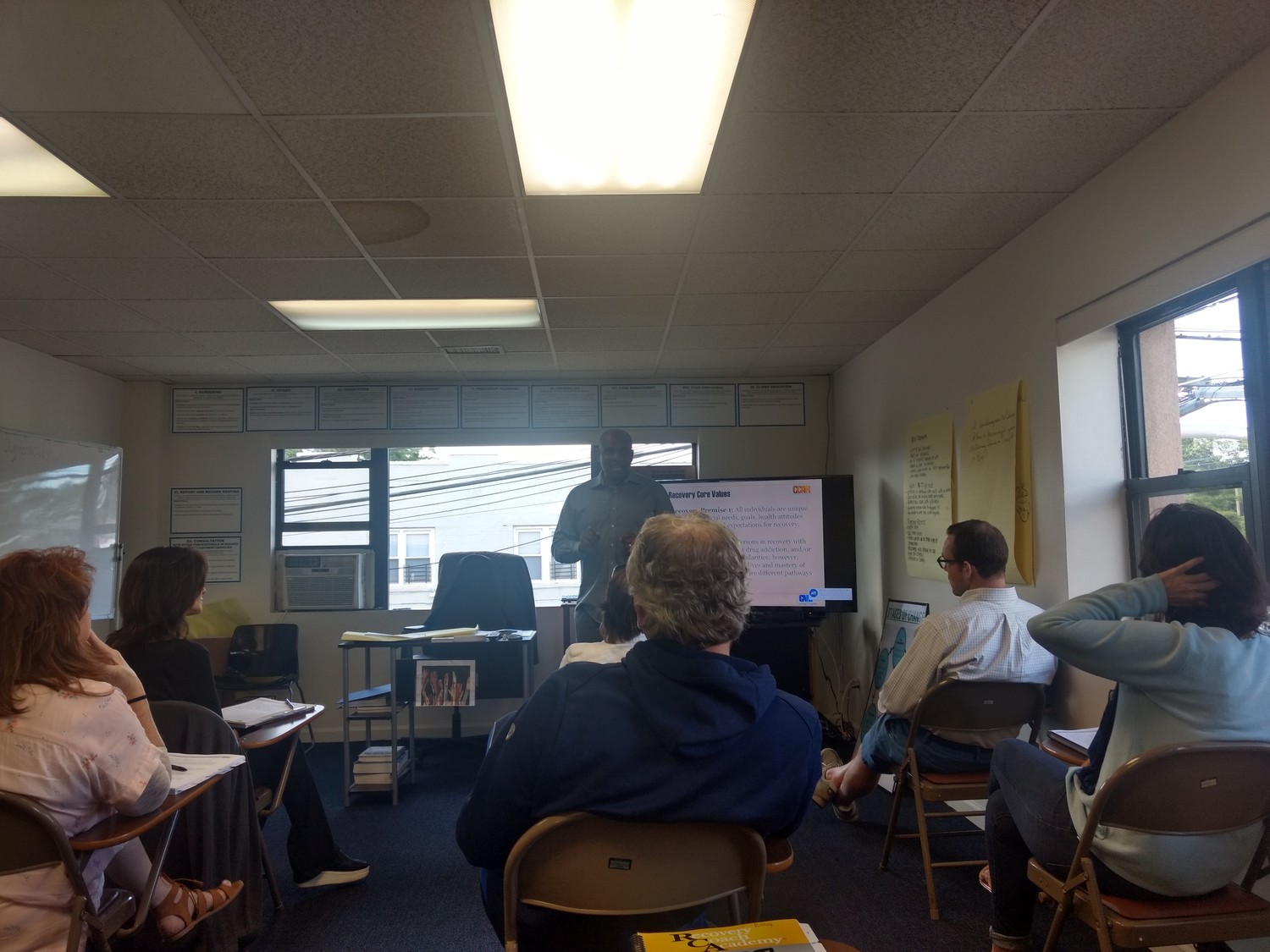Once an addict, now a counselor
Baldwin's Great Escape offers counselor training
A number of years ago, Baldwinite Anthony Bryant said, he saw many counselors who were unable to address the needs of drug addicts in recovery and their families.
“They knew how to work with families, but they didn’t know how to deal with families who had substance-abuse problems,” Bryant, himself a former cocaine addict, said. “They had mental-health degrees or psychology training, but they didn’t really have the corner on people who had deep substance-abuse problems.”
That’s because, Bryant said, many colleges or other programs weren’t teaching people how to address drug abuse head on. So he decided to start his own program. “I said, let me let people know what they’re going to be in for,” he said.
Bryant, 56, a Harlem native, is the founder and executive director of Great Escape Substance Abuse Training and Information, located in a small classroom on the second floor of an office building at Grand Avenue and St. Luke’s Place in Baldwin. Through a variety of programs, he trains adults seeking credentialed alcoholism and substance abuse counselor accreditation, including test preparation for those taking the state exam necessary to become a credentialed counselor.
“Our focus is just on substance abuse,” he said. “We talk about what it does to the community; we talk about what it does biologically, psychologically, sociologically.”
The state Office of Alcohol and Substance Abuse Services oversees the for-profit program, which is a certified education provider.
Before training counselors, Bryant worked as one in different agencies for 18 years. He has a master’s degree in business management and is a state credentialed alcoholism and substance abuse counselor.
On June 5, Bryant, spoke to the Herald before leading a recovery coach training session. Becoming a recovery coach requires a 30-hour class that provides the needed skills to counsel those trying to get away or stay away from drugs or alcohol.
“This is for people who are trying to be supportive in nature, not clinical,” he said.
Great Escape opened in 2012 and has received citations from former Nassau County Executive Ed Mangano, New York City Congresswoman Grace Meng and former Freeport Mayor Andrew Hardwick for its work in training people to help those fighting addiction.
During one recent class, which the Herald sat in on, Bryant said the key to treating people is to address their individual needs — and not to take a cookie-cutter approach to drug abuse.
He and his wife moved to Long Island about five years ago, in part, to get away from New York City, but also to help address the opioid crisis here. “There’s a need here,” he said. “Children were dying; people were dying out here. It was like every other day I was getting a phone call, this person needs help, this one is hooked on fentanyl.”
Esther Hughes, his wife and the executive administrator of Great Escape, said students come from across Long Island and New York City. “The hours work for a lot of people,” she said.
Many who come, she added, are former addicts themselves. “They realized what an impact a counselor had on their lives,” Hughes said. “That’s going to be a good 50 percent” of students.
Bryant, who was addicted to cocaine in the 1980s and ’90s, said substance abuse ran in his family, and he lost relatives to it. Drug addiction was common in Harlem, he noted. “It was, I’m not going to say acceptable, but it wasn’t out of the norm,” he said. “In that area, a lot of people were addicted to substances.”
He has been clean for 24 years. He said he kicked his drug habit because he “was tired of the consequences of my use.
“I got kicked out of where I was staying by a young lady,” he added, “and that was the situation that said to me, ‘I had a problem.’”
Another reason former addicts enter the field, Hughes said, is because it is “very forgiving” one, meaning a criminal record does not necessarily bar someone from getting a job. The state screens counselor applicants, but only for serious crimes involving children.
“If it’s something like a theft or a crime that came out of your drug use, it’s not something that’s going to prevent you from getting a position,” Hughes said.
Alfonso Washington Sr. spent 12 years in prison for conspiracy to commit murder — today he still claims he’s innocent. Not 90 days after getting out of prison, he signed up with Great Escape. He is now a case manager with Camba, a social service group in Brooklyn.
“I owe 99 percent of that to Great Escape,” Washington said in a telephone interview. “I believe it played a big part in who I am today, because I have the textbook knowledge and life experience to help me, help others.”
Great Escape also provides recovery coach referrals for those suffering from addiction. It can be reached at (516) 442-1967.

 44.0°,
Mostly Cloudy
44.0°,
Mostly Cloudy 




